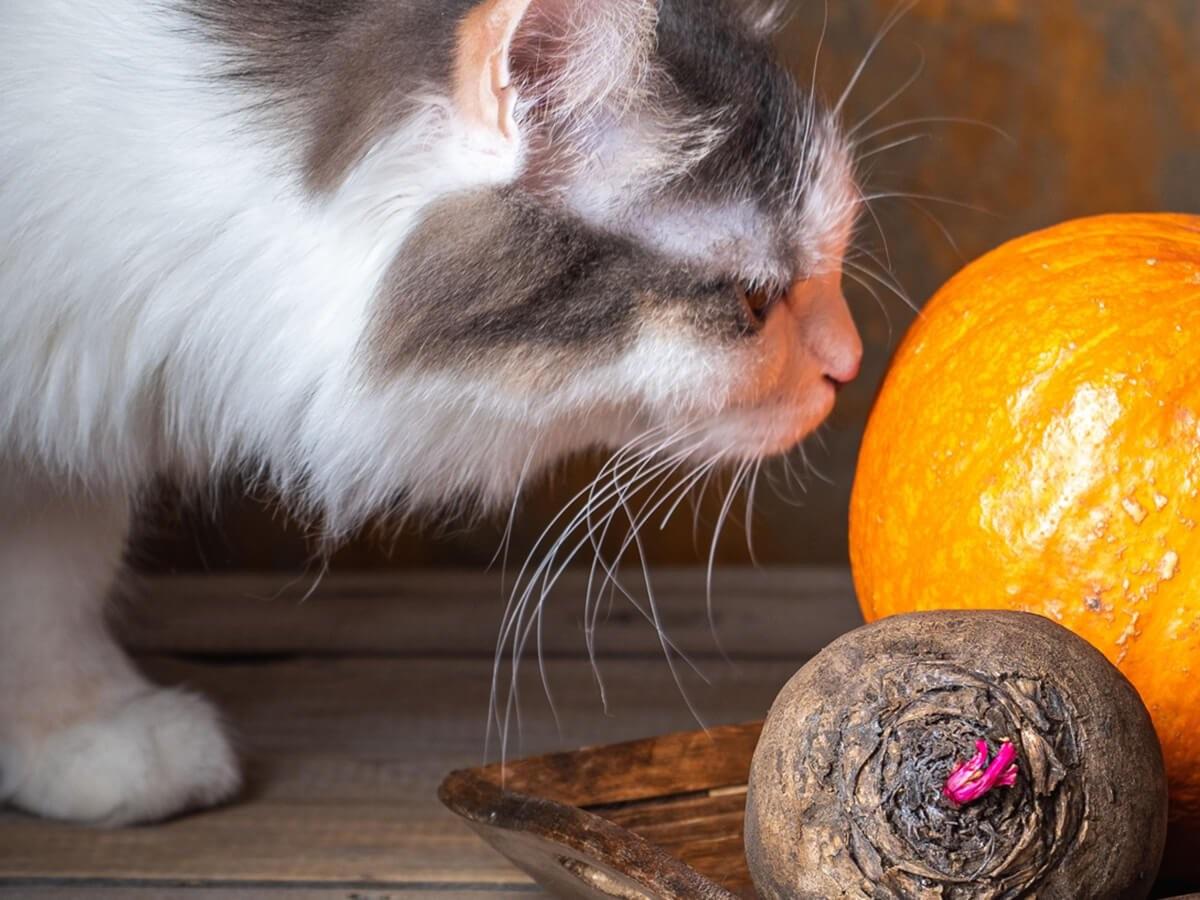Pumpkin is a fall favorite, but is it safe for our feline friends? The answer is yes, cooked pumpkin can be a healthy occasional treat with potential benefits for your cat. However, it's important to understand safe preparation and when to consult your veterinarian.
Understanding Pumpkin's Appeal for Cats
While cats thrive on meat-based diets, some do enjoy the mild, slightly sweet flavor of cooked pumpkin. Its creamy texture once mashed or pureed also appeals to certain feline palates. However, don't be surprised if your cat turns up their nose at this veggie – as with anything, there's individual preference.
Pumpkins for Cats: Not a Replacement for Regular Diet
Cats are obligate carnivores, meaning their primary nutritional needs are met through meat-based diets. High-quality cat food is formulated to provide the correct balance of vitamins and minerals. Pumpkin should be treated as a supplement, not a dietary staple.
Potential Benefits of Pumpkin for Cats
Digestive Support: Pumpkin is high in soluble fiber, helpful for both constipation and diarrhea. Its water content can also aid in hydration. Veterinarians sometimes recommend it for mild digestive issues.
Improved Coat and Skin: The zinc and antioxidants in pumpkin might support healthy skin and a glossy coat.
Possible Parasite Prevention: While not a substitute for deworming, some believe pumpkin seeds offer moderate natural protection against intestinal parasites.
Immune System Boost: Antioxidants like Vitamin C and beta-carotene found in pumpkin can support your cat's immune function.
The Do's and Don'ts of Feeding Pumpkin to Cats
Yes, there are some potential dangers to be aware of when feeding a cat pumpkin. Too much pumpkin, especially all at once, can lead to diarrhea due to its high fiber content. Choking hazards exist with raw pumpkin seeds, the stem, or large chunks of pumpkin flesh. It's also important that the pumpkin itself is plain – spices and sweeteners added to many human pumpkin-flavored products can be harmful to cats. Some cats may develop sensitivities or allergies to pumpkin that may manifest as vomiting, diarrhea, or a rash. For all these reasons, moderation and appropriate preparation are key.
Can cats have pumpkin seeds?
Yes, but only in moderation and with careful preparation. Raw pumpkin seeds pose a choking hazard. Roasting pumpkin seeds makes them easier to digest, and grinding them down before offering helps prevent intestinal blockages. However, even roasted seeds can be unhealthy if seasoned with salt, oils, or spices harmful to cats. Pumpkin seeds should be considered an occasional treat rather than a dietary staple.
Important: Consult Your Vet Before Using Pumpkin Medicinally
Never use pumpkin to address health concerns like constipation, diarrhea, or suspected parasites without first consulting your veterinarian. These symptoms can signal underlying medical problems requiring professional diagnosis and treatment.
When Offering Pumpkin is NOT Recommended
Kittens: Until kittens are on a fully solid diet, focus on age-appropriate kitten food. Their digestive systems are still developing.
Cats with Sensitivities: If your cat has a sensitive stomach or food allergies, introducing pumpkin could backfire. It's always best to consult your vet first.
As a Weight-Loss Food: Pumpkin does contain calories, so don't think of it as a replacement for regular food if managing your cat's weight. Talk to your vet about healthy weight management strategies.
How to Safely Serve Pumpkin to Your Cat
Plain & Cooked: Only offer fresh, cooked, or canned pumpkin with NO added sugar, spices, or other ingredients harmful to cats.
Pureed: Mash or puree the pumpkin flesh for easier digestion. Avoid stem, skin, and raw seeds due to potential choking hazards.
Small Amounts: Start with a teaspoon for adult cats, half a teaspoon for smaller cats or kittens. Watch for signs of stomach upset.
Roasted Seeds (Rare Treat): If your cat enjoys them, ground, roasted, unsalted pumpkin seeds are acceptable in moderation.
Pumpkin Products to Avoid
Pumpkin Pie: The spices, sugar, and dairy used in pumpkin pie can be harmful to your cat.
Other Pumpkin Treats: Many store-bought pumpkin snacks contain unhealthy additives or excessive sugar. Stick to plain pumpkin.
Jack-o'-Lanterns: Don't feed your cat leftover pumpkins; these are often moldy or rotten!
Expert Insights From Spot
While it can be fun to share our favorite foods with our pets, pet parents should keep in mind that sometimes, eating human food can upset a pet's stomach. Internal data from Spot Pet Insurance shows that on average, claims for dietary indiscretions (pets eating too much of what they shouldn't) cost $572. This high cost highlights why pet parents should keep an eye on what their pets eat, and do their research before sharing their favorite snacks with their dogs. Being mindful of what treats we share with our pets can help keep them healthy while helping pet parents avoid unnecessary vet bills.
A Note on Allergies As with any new food, monitor your cat for signs of allergic reactions like vomiting, diarrhea, or rash. Consult your vet if these occur.
Disclaimer
The information in this article is for general knowledge and shouldn't substitute for professional veterinary advice. Always consult your vet about changes to your cat's diet and for appropriate diagnosis and treatment of any health concerns.
With care, pumpkin can be a tasty and beneficial treat for your furry companion!

If you need a story or someone to talk to your cat like a person, I’m your person. With 3 cats, 1 dog, and a lifetime of pets, I write from experience, usually with a cat on my keyboard and a dog in my lap.
Understanding antioxidants | Harvard Health
The Importance Of Greens For Cats | Sunvet Animal Wellness
Cats Are Carnivores, So They Should Eat Like One | Texas A&M













